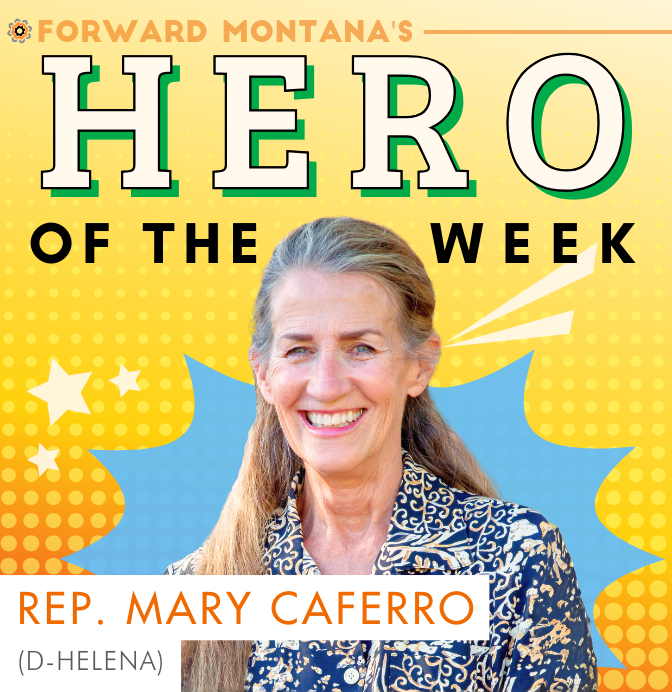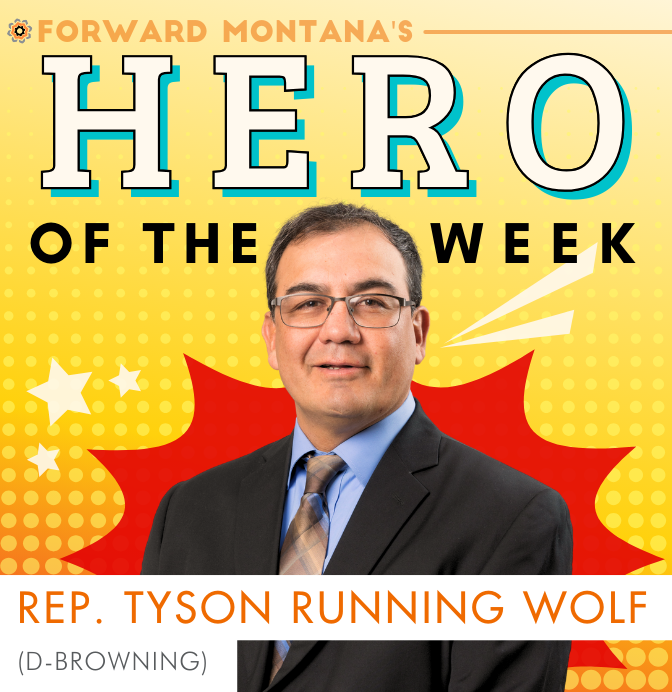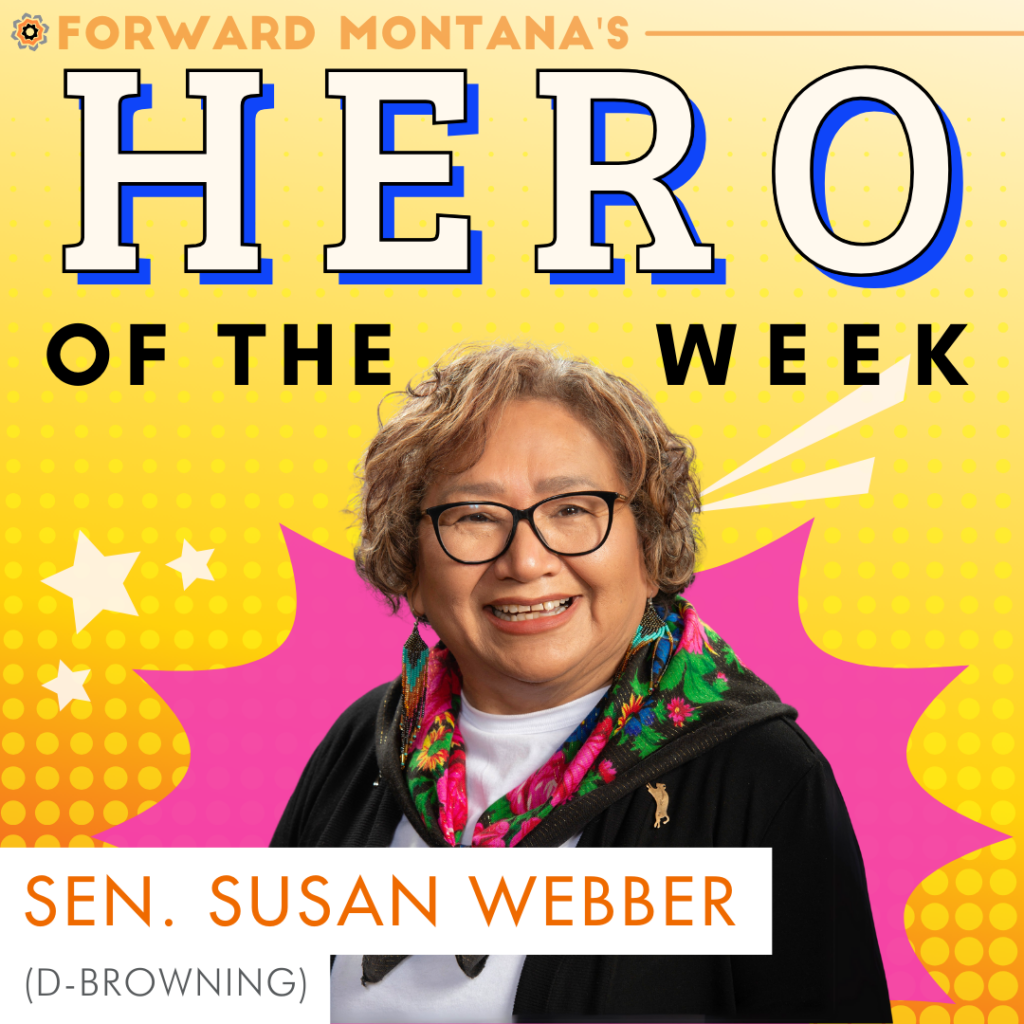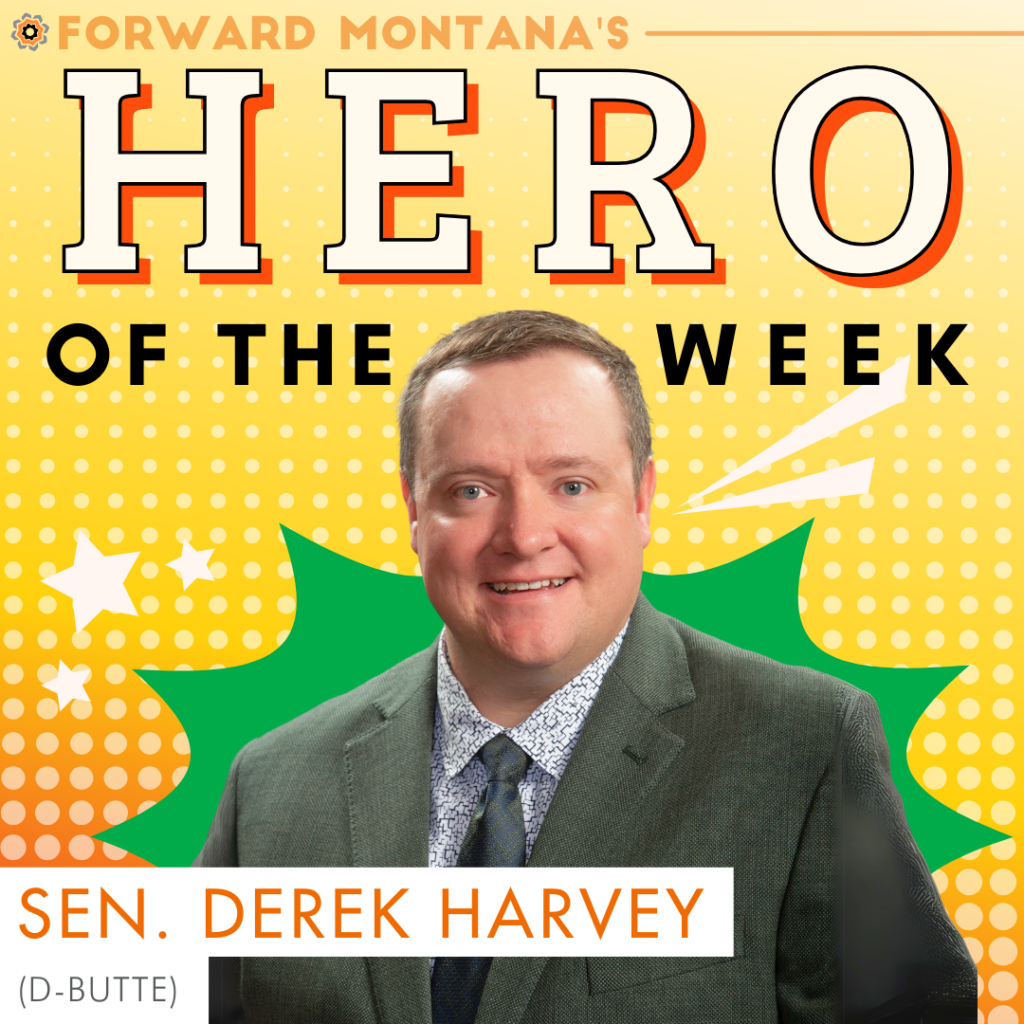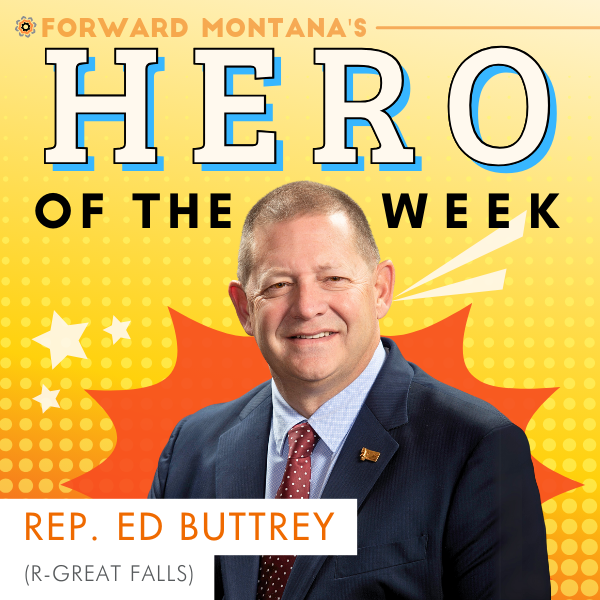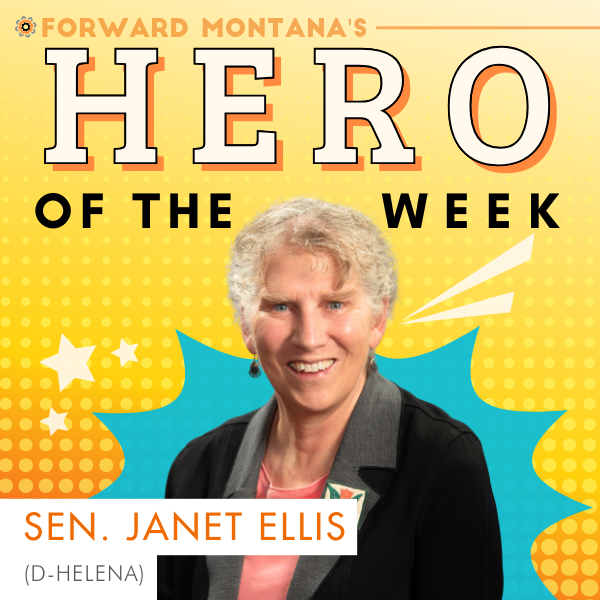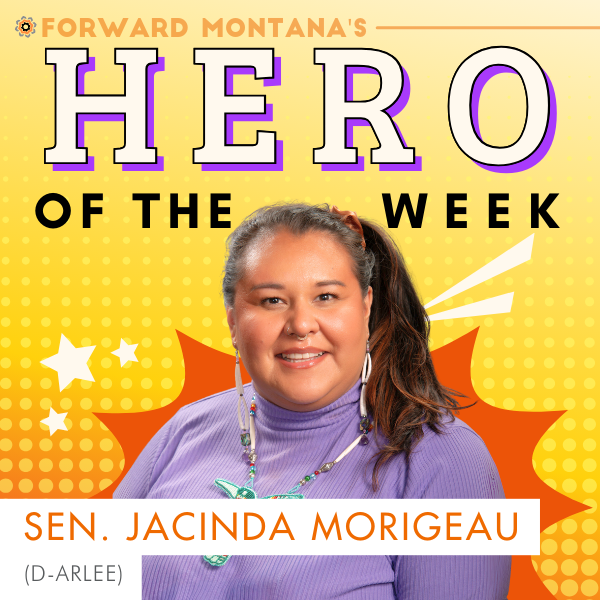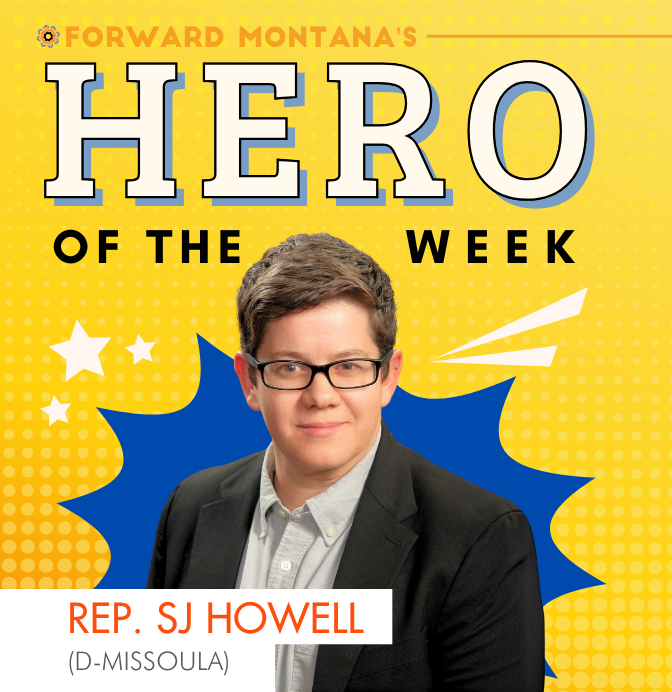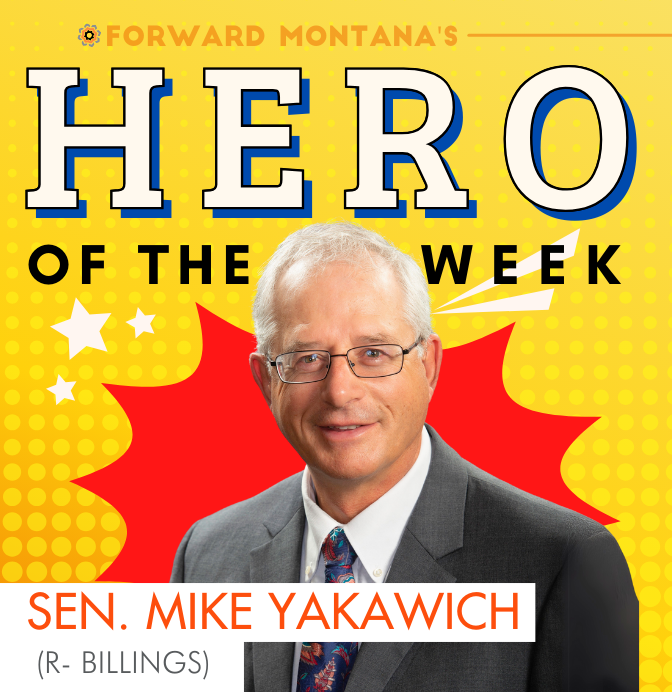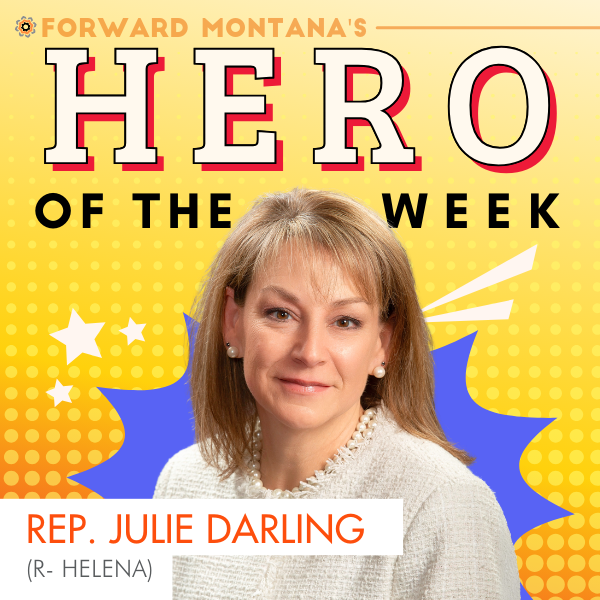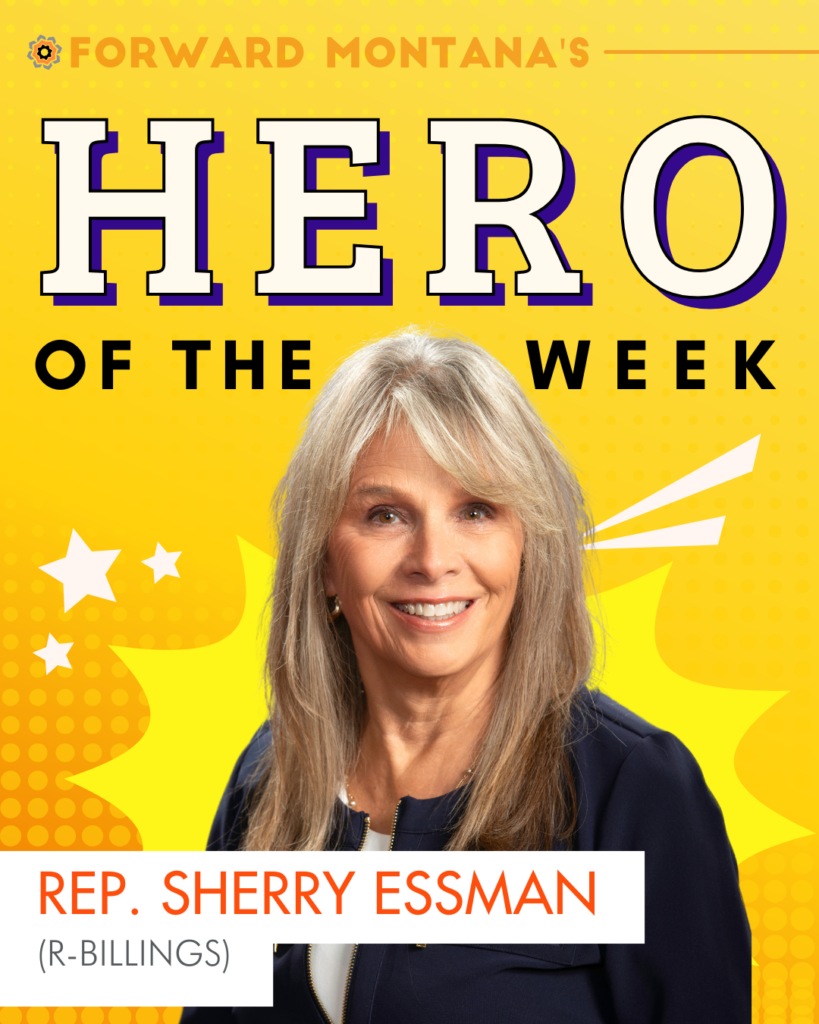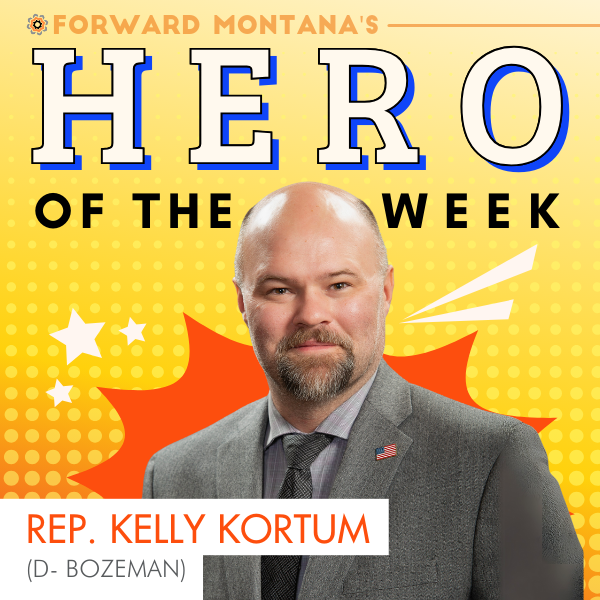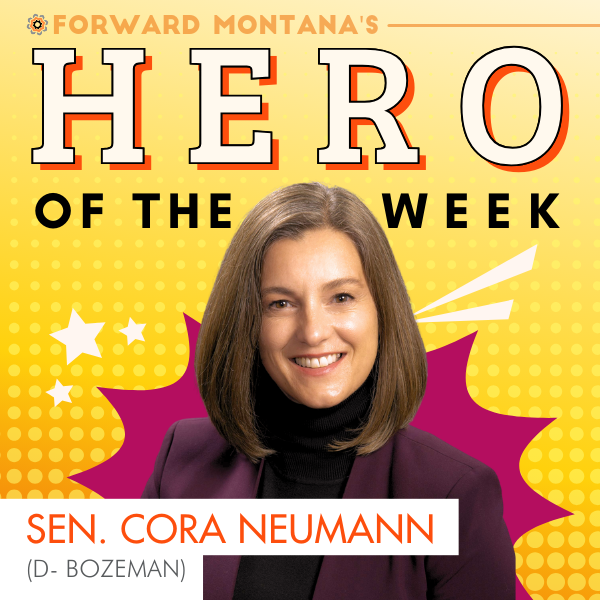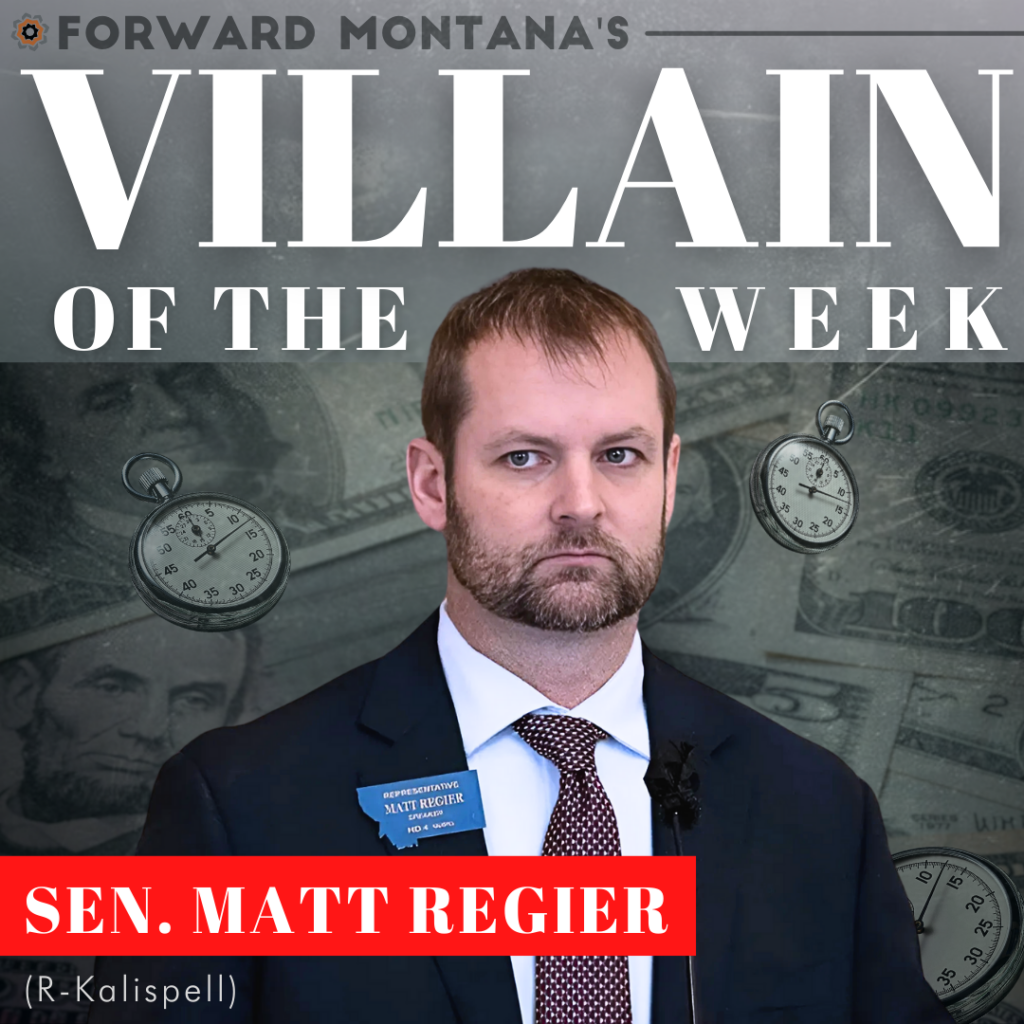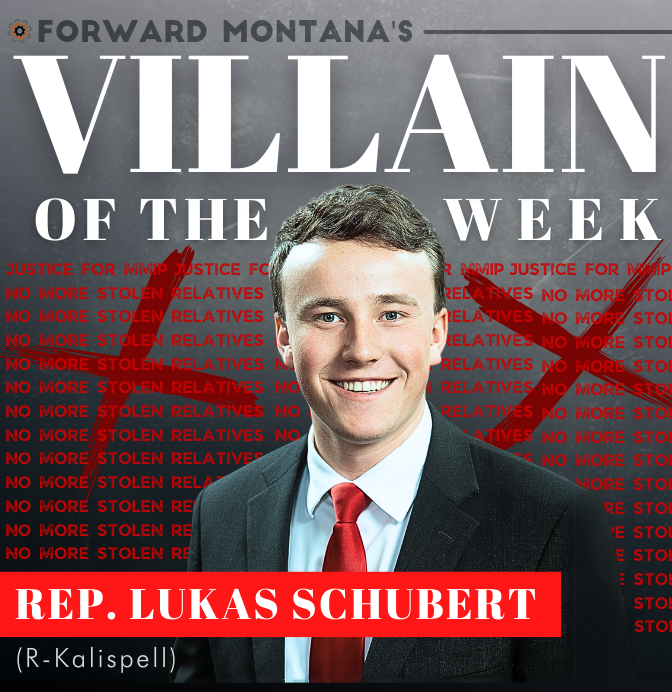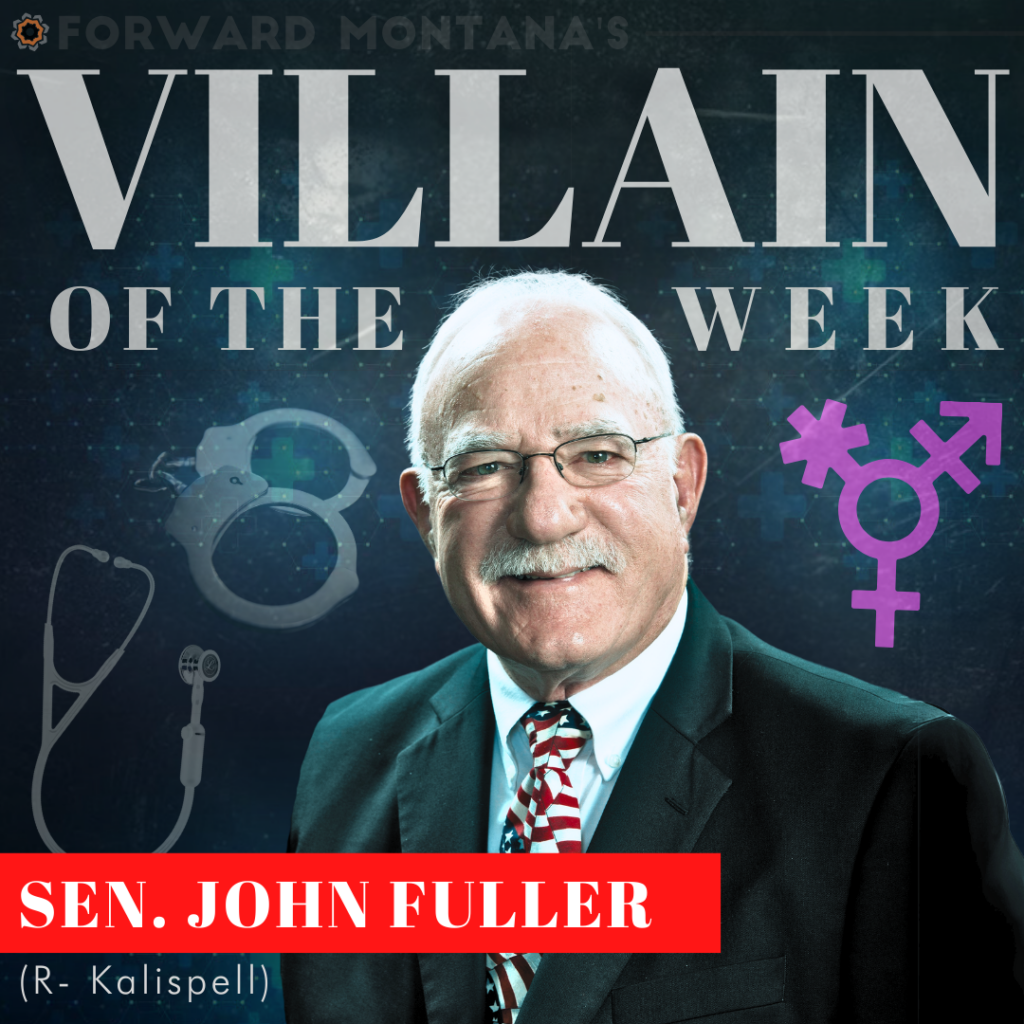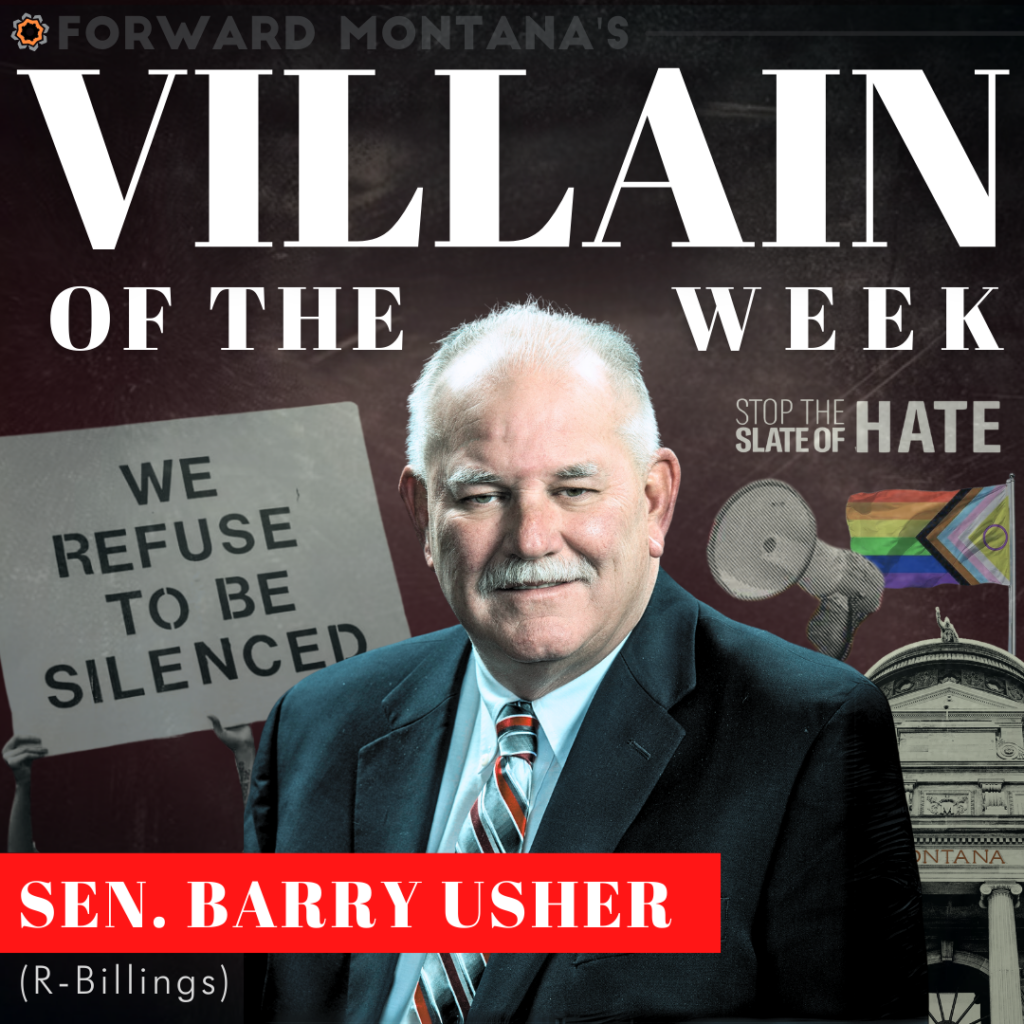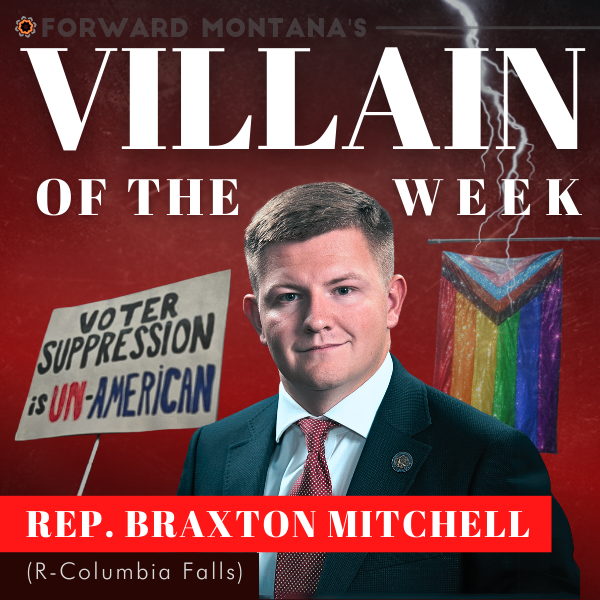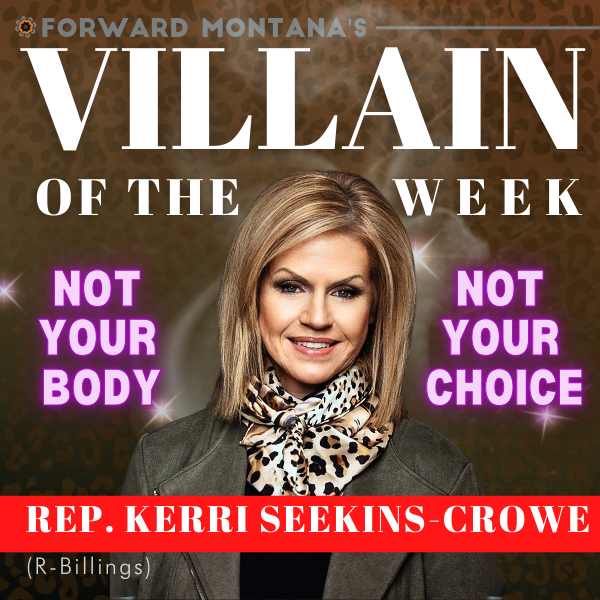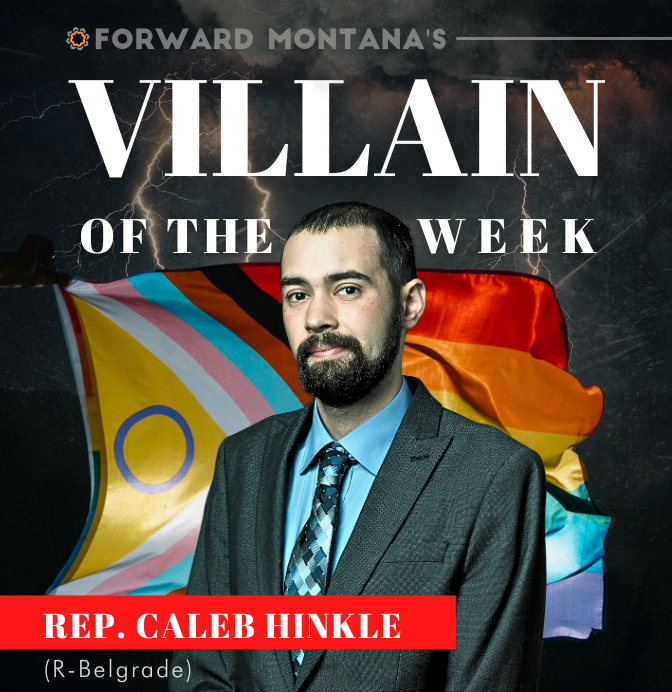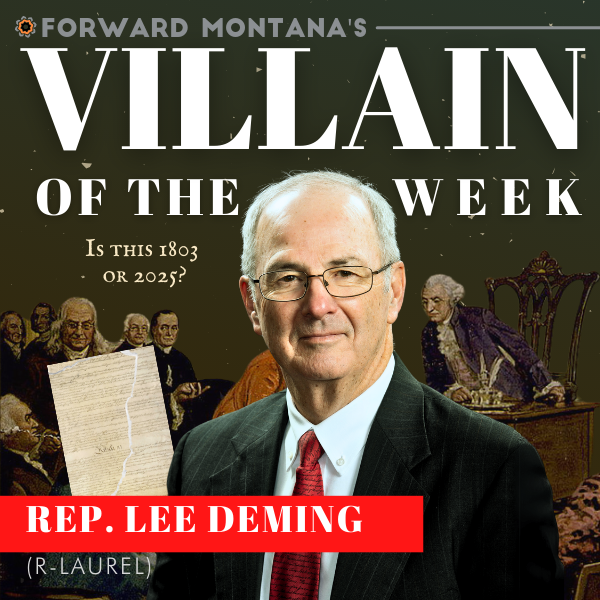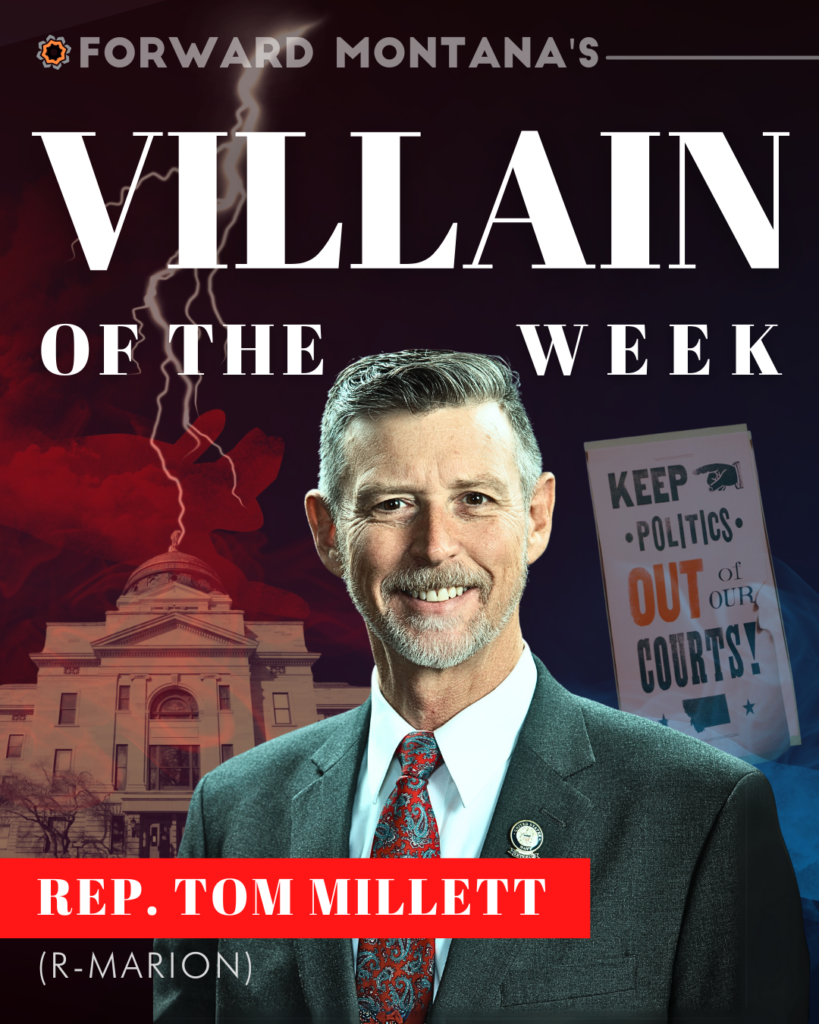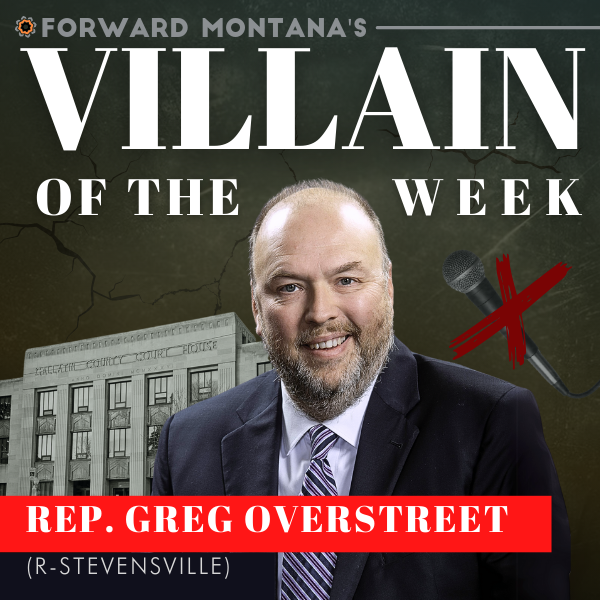
The 69th Montana Legislative Session concluded on April 30, 2025.
“What the Helena” is back for another Montana Legislative Session! As with past years the f**kery has begun which means… more of our high-energy, no-bullshit way to stay informed on the news that matters to young Montanans. We will be keeping up on the issues right here or if you like your news in your inbox subscribe to weekly email updates or maybe you like listening to your news, so listen here for our “What The Helena” podcast.
Pro-Democracy
Week 12- The last few legislative sessions have seen numerous attempts to pass unconstitutional policies. Even when provided legal analysis, legislators and proponents of these policies insisted that they move forward. Now, citing court decisions that blocked the implementation of these unconstitutional bills, a group of legislators is trying a different strategy: destroy our impartial judicial system.
Of the over 30 bills this session trying to mess with this branch of government, legislators put forward 4 options to change how judges are chosen – and undermine the checks and balances of our democracy. Three of these dangerous bills are still moving and were debated in the House Judiciary committee this week.
Montana is one of dozens of states that elect our judges through nonpartisan races. We have laws that prohibit political donations and party affiliation for judicial candidates. This isn’t random – the decision to have nonpartisan elections was fiercely debated through public forums during the Montana Constitution Convention in 1972, when political corruption of the Copper Kings was not yet forgotten.
Two bills, SB 42 and HB 838, would change this – creating partisan election of judges and allowing for the influx of political money to determine who ends up in charge of our courtrooms.
This will impact more than decisions on constitutional challenge cases – SB 42 would politicize judges at every level: municipal judges who oversee your unpaid parking tickets, family law judges who decide child custody cases, district court judges who oversee employee rights cases. All of these judges are in jeopardy of becoming beholden to a political platform on how to rule in the courtroom.
While HB 838 would only affect Montana supreme court judicial elections, it is no less egregious. Our state’s highest court doesn’t only hear the appeals from lower courts – these seven justices are the final decision-makers on cases that move out of the lower courts such as voting rights, rights to privacy, and water rights.
The third bill, HB 506, would take away voters’ ability to elect Montana supreme court justices – and give the power to a selection committee made up of the Governor plus majority and minority party leadership – a system referred to as ‘merit-appointment’. We only imagine the raucous political debate and opaque decisions of such a committee.
Week 11- That isn’t the only bill on Wednesday. In the same committee, we will hear SB 42, which would undermine the foundation of our fair and impartial judiciary, by mandating the partisan election of Montana judges and justices – which most Montanans are adamantly against. The House already voted down a similar bill HB 295. Send them a message, remind them of this vote, and ask them to vote down SB 42.
During their Saturday, March 15 debate, Senators shocked us by voting down anti-judiciary HB 169. This bill is one of many this session to infuse partisanship into our judicial system. HB 169 specifically would have allowed judges to participate in political events and accept partisan endorsements. We were ecstatic to see it fail 22-27 on the Senate floor!
Week 8- SB 490 had a hearing on Saturday, March 1st in the Senate Judiciary. This bill would limit same-day voter registration and disenfranchise Montanans – disproportionately impacting students, rural voters, seniors, and working families. Interfering with same-day voter registration has already been ruled unconstitutional by Montana courts. Send a message to the Senate and tell them to vote NO on SB 490.
After weeks of waiting, we finally have some updates on the anti-judiciary bills that are attempting to make judicial elections partisan.
Since 1935, Montana’s judicial elections have been nonpartisan. This means that political parties cannot endorse or contribute to them. A nonpartisan judicial system ensures that judicial races remain impartial and protected from the interference of partisan politics. Courts managed by nonpartisan judges uphold the values of fairness and rule of law in the courtroom when deciding criminal, civil, and constitutional cases.
In early February we watched hearings for SB 42 and HB 295, both of which would force judicial candidates to claim a political party affiliation and open the floodgates for partisan money to influence these elections. These bills had their floor debates this week, with mixed results. While we watched some conservatives misrepresent our judicial system by claiming Montana already has partisan elections of judges and calling out advocacy groups by name for voter engagement from the 2024 MT Supreme Court Justice races.
Only the Senate voted in favor of these judicial attacks, with 29 Senators voting yes to move SB 42 on to a House committee hearing, which will likely be held after transmittal break (March 7-13). In the House, representatives rejected HB 295 with 53 voting against it. Shout out to the 15 Republicans and over 70 Democrats voting to protect our impartial judicial system!
There are two more anit-judiciary bills headed our way in the next week. One, HB 506, would change the Montana Constitution to remove Montana Supreme Court elections entirely, instead giving the power to the governor and a nomination committee to appoint members of the Montana Supreme Court. This bill had a hearing last week in the House Judiciary, and is anticipated to pass through to the floor for debate. Reminder: bills to amend our Montana Constitution require ⅔ vote to pass through each chamber – this means 67 Representatives will have to vote for it to move on to the Senate. Feel free to message your representatives to confirm they will be voting NO on HB 506.
Finally, we are watching a sleeper bill draft, LC 2372 requested by Majority Leader Steve Fitzpatrick. Draft language indicates that this bill would allow for Montana Supreme Court Justice candidates to indicate a political party affiliation.
Damn, some legislators really aren’t getting it: the majority of Montanans support an impartial judiciary.
Week 2- If you are feeling overwhelmed with the number of bills related to changes to our judiciary, we get it, it’s a lot. Along with a number of new pieces of legislation, there are 27 bills that were drafted during the interim through the Senate Select Committee on Judicial Oversight and Reform.
For reference, the Senate Select Committee on Judicial Oversight and Reform was formed in the spring 2024, after the Montana Supreme Court reminded the legislature that they cannot pass unconstitutional laws. In response, former Senate President Jason Ellsworth (SD 43 – Hamilton) put together this new Select Committee, declaring that the courts had overstepped the separation of powers and accused several courts of violating the state Constitution.
After developing the Republican membership for the Select Committee, Sen. Ellsworth invited Democratic leadership to send their members. And while you may see Democrats’ names listed in the membership, they refused to legitimize the committee and did not attend a single meeting.
So within the echo chamber of the Senate Select Committee on Judicial Oversight and Reform, a faction of Republicans drafted 27 committee bills. Which leaves us with the question: which are innocuous (if any) and which, if passed, would undermine the impartiality and power of our courts system? We hope to have a clearer answer for you by next week.
For now, SB 42, is raising the greatest concern for us, which would provide for the partisan election of judges and justices. Currently, our judicial elections are nonpartisan, meaning that candidates do not have a political party affiliation and instead are given the opportunity to run on merit and judicial values.SB 42 will also impact judicial campaigns and the type of money we could see flooding into those elections.
Week 1- Before the senate stalled, there were a slew of bills scheduled that seek to undermine our state’s fair and impartial judiciary, particularly aimed at the Montana Supreme Court.
This is in response to MT SCOTUS persistent reminders this past year to the legislature that they cannot pass unconstitutional policy. Conservatives have declared war on the separation of powers and the court’s authority. We expect to know more next week on when these bills will be scheduled. Keep an eye out for calls to action regarding judicial attacks.
LGBTQ+
Week 12- Also up next week is HB 400, Enact the “Free to Speak Act”, from Rep. Braxton Mitchell. As a reminder, this bill would prohibit schools and public agencies from implementing policies that protect LGBTQ individuals from harassment or discrimination. Send a message to Senators by the end of next week and tell them to vote NO on HB 400. Want to testify? HB 400 will be heard in Senate Judiciary on Wednesday April 2nd at 8am.
Week 11- If you missed those hearings, no you didn’t because they were filled with the same hateful and blatantly transphobic language from bill sponsors and proponents. Skip messaging the committees on these bills. Instead, send comments to each Senator about HB 446 and each Representative about SB 218 & SB 164.
The next piece of anti-trans legislation, SB 437, will be heard in the House Judiciary committee on Wednesday Mar 26. SB 437 is the latest effort to define ‘sex’ in law – and legally erase transgender and intersex individuals across Montana’s legal code. Please send a message to the committee before the hearing and tell them to vote no on this unconstitutional bill.
Week 9- One housing victory included Rep. Kelly Kortum’s HB 311, which would require landlords to reimburse any rental application fees that don’t lead to a rental agreement, saving renters hundreds of dollars! After being tabled in committee, Rep. Kortum successfully ‘blasted’ HB 311 to the House Floor, where it received overwhelming support (67-32). This is the only time this session that a tenant’s rights bill successfully landed a second hearing.
Unfortunately, Sen. Greg Hertz’s SB 336 passed through the Senate. This bill, which would restrict local government’s ability to regulate or prohibit short-term rentals in residential areas, received bipartisan support. With a housing crisis impacting many across our state, we are disappointed to see that some legislators support policy that undermines young people’s ability to find and afford stable housing.
Week 8- Do we have a doozy for you. SJ 15 would formally declare that the US Supreme Court must reverse the Obergfell v. Hodges ruling: the landmark case that legalized same sex marriage, which would set us back a decade of progress. SJ 15 has a hearing in the Senate Judiciary on March 3 at 7am. This is not an issue of states rights but it discriminatory, an overreach and the last thing we need from our legislature.
Week 6 We continue to face disgusting and misinformed anti-trans bills this session. We think we speak for every trans person when we say: it is time to address our housing crisis, rather than sit through another hearing full of obtuse and witless people debate trans rights.
Conservative talking head Rep. Braxton Mitchell (R-Columbia Falls) is pushing HB 400, which would prevent public institutions (e.g. public schools, public libraries,etc) from protecting students and employees from anti-trans discrimination. If this sounds familiar, it is because this bill builds off last session’s HB 361 – which made it law that misgendering and deadnaming students is not legally discriminatory behavior. So much for keeping youth safe.
Now, HB 400 would expand this to prohibit public institutions and agencies from implementing policies that would prevent this type of discriminatory behavior. *Sigh* For a party obsessed with ‘protecting’ children, they continue to demonstrate they are committed to harming trangender youth – and adults.
Committee Republicans threw bad faith questions at opponents, which included backhanded insults when allies to transgender students didn’t fall for Republicans’ ‘gotcha’ questions.
As we prepared for HB 400, we saw Rep. Jedidiah Hinkle (R-Belgrade) has introduced a violent piece of legislation focused on continuing his obsession with other people’s genitalia. HB 446 would update the laws on indecent exposure – allowing anyone to claim their ‘dignity’ has been violated if they find themselves in a bathroom or changing room with someone who they believe to be a transgender individual. The bill depends on someone seeing another person’s genitalia and deeming it out of compliance with what they think their bits should look like. Our dignity is violated just typing that sentence out.
The reason we think this bill is violent? It would open transgender people up to criminal penalties, including incarceration – a threat to the economic stability of trans people and their families. We’ve heard that Republicans cannot handle learning about and respecting the diversity of our communities. But that doesn’t give them the right to undermine people’s safety. No one has that right.
Week 5- Let’s start with HB 121(bathroom bill), which had its hearing in the Senate Judiciary last Thursday. We will skip the disparaging remarks Republicans insisted on making (nothing new or creative), and let you know that the bill passed out of committee on a party-line vote. It will be heard next week on the Senate floor. Call 406-444-4800 and message Senators. Tell them to VOTE NO on HB 121.
Next, there is SB 164 (ban care for trans youth). This bill was heard on the Senate Floor on Monday. And while two Republicans voted against it, this wasn’t enough to prevent it moving on to the House Chamber. It will likely have a hearing next week in the House Judiciary. Continue to message and call your House Representative and tell them you expect a NO vote on SB 164.
And then, there is HB 300 (youth sports ban) which had its House floor debate on Wednesday. Rep. Seekins-Crowe continued in her disingenuous stance that this bill is about protecting girls in sports. Despite the bill passing on a party-line vote, we were teary-eyed after watching the power of trans voices and allies during the debate.
Starting with Rep. Howell who pulled at our hearts when talking about the rich diversity of humanity that Republicans are insisting on erasing. Then, Rep. Zephyr spoke of the challenges trans athletes already face – and how bills like this make it harder for all women to participate in sports without discrimination. And finally, Rep. Strand put into words what we are all thinking: why tf are we here debating this, when we need elected officials coming up with solutions to housing, health care, and other actual issues Montanans are facing.
Now the shittiest news: There is another anti-trans bill. Senate Bill 218 from Sen. Fuller (R-Kalispell) is a cruel attempt to force doctors to stop providing gender affirming care by threatening them with an absurd statute of limitations for medical malpractice.
The current statute of limitations is 2 years. But SB 218 would allow for a statute of limitation of 25 YEARS for someone to sue if they regretted a gender-affirming procedure. Apparently, Sen. Fuller hasn’t heard – but the regret rate for receiving gender-affirming surgical procedures is around 1%, lower than most operations.
This bill might be about targeting trans people, but it will lead to irreparable harm to our health care system, as doctor’s may choose to leave Montana rather than practice under this threat. This bill will be heard on the Senate floor next week. Call and message your Senator and tell them to vote NO on SB 218.
Week 3- Despite what legislators said last week during the House floor debate on HB 121 – that trans and queer people are part of a woke agenda to undermine our longstanding cultural norms of gender and sexuality, we all know that we have been here forever and will exist well into the future – pending any total climate disaster – but even then…we are frustrated to see that Sen. Fuller, one of Montana’s top transphobes, has a hearing next week on his latest bill targeting trans people.
Senate Bill 164, revised offense of endangering the welfare of children, seeks to criminalize doctors, parents, teachers, or anyone else who facilitates getting a child the health care they deserve. Despite the innumerable debates on this topic, we don’t think that legislators even get what gender affirming care for youth is. And we are not going to uplift their ignorant talking points here. Trans youth and their parents should not face additional barriers to accessing care. But no matter if you agree trans people deserve safety and access to care: everyone should see how fucked it is that elected officials think they can end the privacy between medical professionals and parents seeking care for their children.
SB 164 will be heard on Monday, January 27th in the Senate Judiciary starting at 8am. We ask that if you are an ally to trans people, you submit public comment or provide virtual testimony. Let’s show the Senate Judiciary how angry this hateful bill makes us.
Week 2- (HB121) The bill sponsor’s opening was an attempt to (poorly) assure everyone that this wasn’t about trans people, but by the time the floor voted to end the debate, the Republicans who stood in support of the bill were saying the quiet part loud – and proud: this bill is about targeting trans people.
In the face of this vile opposition, three Democrats succinctly covered why this type of legislation is harmful, to individuals and our community as a whole. It started with Rep. SJ Howell, who ended their speech with an unexpected, humorous quip on Republicans’ own messaging around Montana values of small government. Rep Ed Stafman was the second Democrat to speak in opposition, exposing the economic and legal foolishness of this Republican obsession with harassing trans people.And finally, Rep. Zooey Zephyr stood in powerful defiance at a bill that Republicans won’t deny is also about a direct attack on her.
While the outcome was a party-line vote of 58-42 and we’ll have to endure another hearing in the Senate, we saw from our communities an outpouring of opposition to this bill. Through public comment in committee last Friday, to the number of calls and messages to legislators – our hearts burst to see that we refuse to lose our fight against this type of legislation. Each message makes clear to legislators that we are fucking sick of having to talk about whether trans people get to live safely in our communities.
Week 1- House Bill 121, sponsored by Rep. Kerri Seekins-Crowe, poses as a bill aiming to protect the privacy of (cis)women, but it is a thinly veiled attempt to prevent individuals from using the bathrooms, changing rooms, or private facilities that align with their gender. This bathroom ban is particularly egregious because it would allow anyone to sue public schools, private businesses, and even domestic violence shelters if they believe they’ve encountered someone who is in the “wrong” bathroom.
The House Judiciary committee may vote as soon as Monday to send HB121 to the House floor and its fate on the floor remains uncertain. BUT we were encouraged today during the hearing by the outpouring of comments in opposition. Thank you to everyone who sent in comments already. Stay tuned for next steps and more ways that you can take action against this harmful bill! (edited)
Housing
Week 12- There are two bills up next week that will impact Montana’s housing affordability. First, HB 843 which would create the Montana emergency solutions grant for rapid re-housing. This bill would target state funds towards rapid re-housing options for individuals across our state who face an unexpected loss of housing or struggle to maintain stable housing.
We know that the current housing crisis and economic hardship has caused significant increases of homelessness in our communities. This bill would help address this by providing more comprehensive and flexible housing support – like rental assistance. Please join us in testifying on Monday, March 31st at 3pm or messaging House Human Services before Wednesday, April 2 in support of HB 843.
If the housing crisis wasn’t hard enough, SB 336 could make it worse by removing local control in regulating short-term rentals. This policy prioritizes profit over ensuring there is enough housing for everyone in our community. It has its House hearing on Thursday, April 3rd at 3pm. Please send messages of opposition to the House Local Government by the end of next week – or sign up to testify!
And a follow-up to HB 311: Thursday brought a contentious hearing in the Senate Business, Labor, and Economic Affairs committee. By 8:30 a.m., the room was overflowing—with landlords, renters, realtors, homeowners, and even a former mayor of Bozeman. All there to speak on whether we should require landlords to refund rental application fees to unsuccessful applicants.
Opinions on Montana’s housing crisis varied wildly. Some opponents argued the bill went too far, insisting that the issue needs to be studied in the interim, while others pleaded that fees are burdensome and a bad business practice. We even heard one senator question whether this problem exists at all – ignoring the renters who showed up to share personal testimony. It isn’t too late to send a message to the Senate Business, Labor, and Economic Affairs committee and tell them to vote YES on HB 311.
Week 11- This week, we saw both HB 154 and SB 243 make notable progress through their hearings. HB 154, which was heard in the Senate Taxation committee, would create tax credit opportunities for low income homeowners and renters. It saw strong support with thoughtful testimony from housing advocates and community members. Meanwhile, SB 243 heard in the House Local Government committee, would amend code to allow for taller buildings in higher population communities, saw some community members spouting incoherent arguments to block its progress.
Opponents stated that allowing for taller buildings would make it harder for folks to obtain housing in our communities. Let us be clear: these are classic “Not In My Backyard” (NIMBY) arguments. These assertions are blatantly false, meritless and quite honestly nonsensical. Because of the current housing crisis we have three options; we build out and contribute to urban sprawl, build up (which is the goal of this bill) or we get priced out of our homes and communities (the current course). We see the choice as clear. Both bills will be voted on soon – help us keep momentum going by sending messages of support to their committees.
In an unexpected shift, HB 311 from Rep. Kelly Kortum to mandate rental application fee reimbursement had its scheduled hearing cancelled this week for the best reason: the bill was moved from a notoriously difficult committee to a committee that will more readily consider the merits of this policy.This is huge. As previously stated, committees have a lot of power over which policies get full floor debates. HB 311 will now be heard soon in Senate Business and Labor. Start sending in your messages of support now! We’ll let you know when that hearing gets scheduled.
Week 8- Finally, another good housing policy is on the House floor for debate. HB 492, would rein in unnecessary parking mandates for new builds, costing money to landlords which get passed along to renters, accounting for around 17% of a tenant’s rent – that’s $200-$300! This bill will be heard Saturday, March 1 on the House floor. We will update you in next week’s edition where HB 492 goes.
Week 6- SB 101, which would undermine the judicial eviction process and allow landlords to call law enforcement to remove a tenant from a property, is still in the House Business and Labor committee. Please contact representatives on that committee and tell them to vote NO on SB 101.
Week 5- SB 146 would undermine the ability for cities and counties to pass land-use decisions, like zoning, by setting an impossibly high legal bar. It would also allow for the gutting of thoughtful citizen-led decisions that shaped community land use to address housing issues.
SB 146 passed through its first committee. It is headed to the Senate Floor next. Call and send messages to every Senator.
SB 101 caught our attention this week when we heard from our partners at Catalyst MT and MT Budget & Policy Center that if passed, it could put the shelter and safety of many Montanans at risk – and potentially violate constitutional rights.
SB 101 could undermine the judicial eviction process, allowing landlords to call law enforcement on landlord-tenant disputes. With the cost of housing at all time highs – over 31,000 people paying more than 30% of their income on housing – we need legislators to help us find or keep housing, not allow our landlords to call the cops on us.
Week 3- Over 30% of Montanans are renters. And many people under 35 not only rent, but have begun to assume they may never have a chance to own a home. While we hope that we build a future for expanded home ownership, we need legislators to include renters in their solutions for our housing crisis. Which is why we are so grateful for Rep. Jonathan Karlen, who introduced HB 154. The bill would establish a housing fairness tax credit, and is one of the only bills we’ve seen that includes renters.
Background: Property taxes are one of the top housing issues in our state. They are what tax experts call a ‘regressive’ tax – meaning the tax is applied uniformly, which results in larger takings from low-income individuals than from middle- or upper-class people. This can have a significant financial burden on individuals who do not have the coin to cover the costs.
Rep. Karlen’s bill would create a tax credit to alleviate this cost burden on both homeowners and renters, who of course cover property tax costs through their rent. Most legislators (and advocates) rarely include renters in their conversations or proposals.
As stated by proponents, tax credits like HB 154 connect property taxes to income levels, thus reducing the burden on Montanans who may currently be between jobs, going to school, or a primary caregiver. Tax credits are the most targeted solution to property tax affordability.
Week 2- 🏘️HB 21- Passed through the House with bipartisan support of (75-25), and is headed to House Appropriations for a hearing on the cost of the bill. Where advocates will hopefully demonstrate that this proven program will be a win-win for all Montanans both economically and for affordable housing access. 🤩
#DYK this is the third time this piece of legislation has been introduced in Montana. During previous hearings, there has been a constant theme from the diversity experts in attendance as proponents recognize this bill as an important step in combating the housing crisis that the state is experiencing.
HB 21 would provide a workforce housing credit to provide further funding for affordable housing projects throughout the state, bridging gaps in funding for certified programs and ultimately provide for more affordable housing especially in rural communities.
Week 1- House Bill 21 would establish a Montana Workforce Housing Tax Credit. As most of us are all painfully aware, there is a housing shortage across all our communities. The state’s population continues to grow and lawmakers need to find solutions now to figure out how to support our communities instead of allowing inaction to create further harm to our quality of life and economy.
HB 21 would provide access to additional funding sources, which are badly needed to fund new affordable housing options for working Montanans. The bill had its first hearing in the House Tax Committee on Friday, January 10th – and received overwhelming bipartisan advocate support. We’ll keep you posted on the committee’s decision
Reproductive Rights
Week 12- And finally, HB 388 which would prohibit government oversight of anti-abortion ‘pregnancy centers’ in Montana. A new report from Montanans for Choice shows that Unregulated Pregnancy Centers (UPCs) currently outnumber licensed abortion providers in the state 3:1 and use deceptive marketing practices. These centers also operate in rural communities where access to comprehensive health care is often scarce. HB 388 has a hearing in the Senate Judiciary on Wednesday, April 2 at 8am. Please send a message to Senators by the end of next week, demanding they vote NO on HB 388.
Week 11- In all the hustle of pre-transmittal week, we missed sharing an historic moment for reproductive rights. On Thursday, March 6, the Senate floor debated SB 479, which spread false information that medication abortion is in our water and harming our environment. After Sen. Laura Smith and Sen. Cora Neumann shared powerful personal stories, the Senate floor for the first time in over two decades, voted down an anti-abortion policy, 25-25. Please take a moment to thank Senators who made this win possible!
Week 8- In the deluge of bills from this week, there were two immediate losers from last week’s villain Rep. Kerri Seekins-Crowe: HB 555, which spread false information that medication abortion is in our water and harming our environment; and HB 609. which would have created the new crime of ‘abortion trafficking’. During both hearings, the sponsor and proponents looked absolutely foolish attempting to make their case for suddenly caring about our right to clean water and the importance of criminalizing patients and providers, by presenting made-up scenarios that only exist in pro-life advocates imaginations. Both bills were tabled in committee. We are pleased to see that legislators are ready to accept reality: Abortion is Legal.
Week 5- Remember when we enshrined the right to abortion in November 2024? Well some Republicans legislators are set on undoing this monumental vote.
First up was Rep. Lee Deming (R-Laurel) with HB 316. This bill would amend the Montana constitution to include a definition of personhood that life begins at conception. This would not only ban abortion – interpretations of personhood would jeopardize common forms of birth control, like IUDs and emergency contraception.
What a disgusting attempt at government overreach. While HB 316 would require a ⅔ vote to pass through each chamber, this is highly unlikely and demonstrates how this is clearly a waste of our time.
Enter a more insidious attempt to enshrine personhood into Montana policy, HB 288 from Rep. Courtney Sprunger (R-Kalispell). Rep. Sprunger claims that this is about ensuring both parents are supporting a pregnancy from the beginning by making it law that fatherhood starts at conception. But it only took a few minutes into proponents before we heard that this is about: pressuring people to stop choosing abortions.
For many people, they cannot afford a pregnancy. But instead of economic investments to lift everyone up in our communities, legislators like Rep. Sprunger think that forcing child support payments at conception will allow certain providers to shame patients who choose to have an abortion.
Other important issues
Week 8- Medicaid!
As we watched Saturday’s floor session, we were shocked to learn that a person on Medicaid gets kicked off their health insurance if they have a temporary change in their monthly income – and then have to reapply once their pay inevitably lowers. Unlike with private health insurance we can get through the ACA, individuals on Medicaid are expected to report any changes to their income – if they don’t, they risk being disenrolled
This is why, Rep. SJ Howell (D-Missoula) is sponsoring HB 386, which would allow Medicaid recipients to enjoy 12 months uninterrupted coverage! And, Rep. Howell isn’t stopping there. In HB 601, they are asking the state to create a Medicaid portal, which would expand support for Medicaid applicants and enrollees across the state.
In a true bipartisanship, Rep. SJ Howell has worked with Republicans to get HB 386 and HB 601 passed through committee, with continuous eligibility passing its first House Floor vote 53-47! We are obsessed with affordable health care and appreciate that our hero Rep. SJ Howell is, too.
Week 3- Medicaid
Are we starting at the middle of the week for this update? Yes, and only because it’s so important to mention: Medicaid bills are moving! Renewing Medicaid programs is one of the top issues this session. The last session to debate Medicaid was in 2019. And despite valiant efforts, that bill contained a ‘sunset’ date of June 2025. Now legislators need to draft and pass Medicaid legislation that will ensure these programs continue – and maybe to improve upon the programs?
The first Medicaid hearings took place on Wednesday afternoon, starting with long-time Medicaid advocate Rep. Ed Buttrey’s bill HB 245. This bill does two things: lifts the sunset, and expands resources for workforce development. The second bill HB 230, sponsored by Rep. Mary Caferro, not only lifts the sunset but seeks to expand access to programs, by recommitting to continuous eligibility and reopening Offices of Public Assistance to support Medicaid recipients in navigating the process of enrollment.
For both bills, the hearing room could barely contain the numerous proponents, from hospital lobbyists, health care advocates, to community members from across Montana who came to share their Medicaid stories. And the best part? No one dared show their face in opposition to these essential, life-saving programs. Congratulations to everyone who worked their asses off to make these two hearings a success!
Find your legislators and their contact information
The Legislator Lookup will tell you who your legislators are based on your home address. You can also search for legislators by name to find their contact info.
How to submit public comment and sign up to testify
As with most things related to the State of Montana there are always changes. If you want to submit a public comment or virtually testify this session it works a bit different. Here are the steps you need to take!
- Make an account by going here
- You’ll see several options to select, throughout this session we will be directing you to the Standing Committee section to either testify remotely and/or submit testimony (public comment).
- We will direct you to specific bills or committees to address either as an opponent or proponent. We will do our best to make it clear what we are supporting and what we strongly oppose.
Stay engaged this session and make your thoughts known to your legislators! Looking for some pointers on giving public comment? We’ve got you covered with a handy one pager on best practices
If you are looking for more information and guidance around crafting your public comment, writing an LTE, or reaching out to your legislator we have a step by step guide with more information here!
2025 Heroes of the Week
2025 Villains of the Week
The below information and hero/villains are from the 2023 legislative session that ended on May 3, 2023!
Queer & Trans Rights
Week 10- SB99 update- While following the path of this bill, it became very clear that supporters are not actually concerned about minors’ health, their concern is with minors’ identities. They don’t believe that young people and their families should be able to choose gender-affirming care, and they don’t believe that teachers should support trans students’ social transition, because something about a bunch of trans kids freaks them out….
And maybe they should be concerned! Maybe, young people with the critical thinking skills to question binaries and social constructs and the courage to live authentically are a very real threat to their worldviews – and their power. These cowards in the legislature are unsettled by what they see as a “fad” because they don’t want to admit that REAL change and transformation is occurring.
To the young people who will be affected by this bill, we recognize & validate your identity and want to affirm that while your body has been politicized, it is still YOURS.
Week 8 – This week they’re trying to define people out of legal existence with SB 458, which would “define sex in Montana law”. We’ll just paste their definition of “sex” here: “Sex” means the organization of the body and gametes for reproduction in human beings and other organisms. In human beings, there are exactly two sexes, male and female, with two corresponding gametes. The sexes are determined by the biological indication of male or female, including sex chromosomes, gonads, and nonambiguous internal and external genitalia present at birth, without regard to an individual’s psychological, chosen, or subjective experience of gender.
Week 7- HB 359, the bill that would ban minors from attending drag shows, restrict drag performances to “sexually oriented businesses,” and criminalize any trans performer for their art, passed in committee last week, but has not been voted on in the House yet, which means that it’s time to urge your Representatives to vote NO on this unenforceable, stigmatizing, and generally terrible bill.
Since our last update, several discriminatory bills have moved forward in the legislative process; HB 234 and HB 361 passed in the House, and we mentioned last week that SB 99 and HB 303 have also passed in their respective chambers (for a refresher on these bills, check out info linked to the bill number).
Week 6- House Bill 359, sponsored by Rep. Braxton Mitchell of Columbia Falls, would do a lot more than “prohibit minors from attending drag shows.” While stepping into the role of all parents in Montana is already way out of the legislature’s lane, the bill also creates a legal definition of the art form that not only sexualizes performers, but also conflates any performance marked by gender non-conformity with ‘drag’
During the Senate floor hearing on SB 99 on Tuesday, some Senators seemed hell-bent on using stigmatizing, offensive terms and analogies for gender-affirming care, including making comparisons to lobotomies and amputations of healthy limbs. Senator Flowers wasn’t having it, and interrupted this language every. Single. Time. While the bill passed its vote on the floor and will now move to the House (where we’ll keep fighting it with everything we’ve got), Senator Flowers and the rest of the Senate Democrats refused to let it do so quietly.
Week 5- Despite overwhelming opposition from Montana families, teachers, medical professionals, and trans youth, SB 99 passed out of committee on Monday. Contact your Senator and let them know that you support trans youth’s access to gender-affirming care and oppose this harmful and unconstitutional bill.
HB 361 essentially allows students to deadname and misgender transgender students with no disciplinary repercussions. This bill “clarifies” the list of unlawful discriminatory practices in education to specifically exclude “calling another student by the student’s legal name” or referring “to another student by the student’s sex” – euphemistic language that would permit transphobic bullying and discrimination in schools. By interfering with schools’ abilities to handle student conflicts in a way that is affirming, legislators are again ignoring the mental wellbeing of trans, non-binary, and Two-Spirit youth.
Let the House Judiciary Committee know that you don’t care much for transphobic, regressive and overreaching policies, and send them a message urging them to vote NO on HB 361.
A hearing for HB 361 will be held on Wednesday, February 8th at 8am, and folks will be able to sign up for virtual comment starting on February 5th. If you’re able to testify in person, you don’t need to sign up!
Week 4- On Friday (1/27), a hearing for SB 99 began at 8am and lasted until 1pm, filled with an overwhelming majority of local trans advocates opposing the bill, which attacks trans, non-binary, and Two-Spirit youth’s right to gender-affirming care.
From those supporting this harmful bill, we heard a lot of misinformed and misleading testimony, with many proponents from out of state, including some notorious political detransitioners and a representative of the Family Policy Alliance, a group that submits draft bills like SB 99 to legislators at a national level.But guess what? Montanans showed the f up to this hearing in support of their trans family members, patients, friends, students, and selves, outnumbering proponents nearly 4 to 1.
One clear, powerful message stood out: the choice to seek gender-affirming care is a right and saves lives, and denying care to youth disrespects, disempowers, and endangers children. Stand with medical professionals, families, public employees, and most of all, trans Montanans, and send a message to your Senator and the Senate Judiciary Committee urging that they vote NO on SB 99.
Week 2– A hearing for SB 99, Sen. John Fuller’s bill to ban gender-affirming care for young Montanans, has not yet been scheduled. However, y’all have already shown us that you won’t tolerate these attacks on freedom and privacy– at our Thursday night phone bank, volunteers made over 300 calls and sent upwards of a THOUSAND texts urging Montanans to voice their opposition to this and other anti-trans legislation. This gives us all kinds of hope
Senate Bill 99 would harm current and future trans, non-binary and two-spirit youth by taking away their access to lifesaving, gender-affirming healthcare. You can voice your opposition at this link: bit.ly/takeactionsb99 and ask the Senate Judiciary Committee to OPPOSE SB 99!
Week 1– started off with the introduction of SB 99 by our first Villain of the Week- Senator John Fuller of Kalispell. Scroll down to read about the anti-trans bill that’s been introduced. Want to get involved? Sign-up and join the phone/text bank happening Jan. 12 from 6 p.m.-8p.m.
Housing
Week 14- This week, a handful of zoning reform bills we’ve been excited to support were voted on in the House. First, a quick breakdown of each bill:
SB 245 legalizes multi-family and mixed-use developments in areas currently zoned for commercial, retail, or parking use, helping Montana move toward more dense and walkable cities.
SB 323 legalizes duplexes, triplexes, and fourplexes in areas of cities with a population larger than 50,000 that are currently zoned for single-family construction only.
SB 382 presents local governments with a menu of zoning reform options, requiring them to adopt the five that they believe will best help their towns increase the supply of attainable housing.
All three of these reforms passed the House with incredible bipartisan support, and will now head to the Governor’s desk to be signed into law. As if that’s not enough good news…
SB 268, which would have significantly impeded local governments’ ability to regulate short-term rentals (like Airbnb) was resoundingly rejected by the House, with just 27 of the 100 Representatives voting in favor of the bill. This is an absolutely crucial step toward ensuring the new development options opened up by the suite of zoning reforms are used to house Montanans, not for wealthy developers and out-of-state investors to make a quick buck.
Week 11- SB 268,sponsored by Sen. Greg Hertz of Polson, would do two things: first, it would define short-term rentals, like Airbnbs, as a residential (not commercial) use of property. Second, it would severely restrict local governments’ abilities to regulate short-term rentals in their cities. The impacts of these short-term rentals hit the hardest on a local level, and local governments need to be able to regulate these rentals in ways that make sense for their communities. SB 268 would take away that ability.
Week- 10- HB 574, a bill to establish a workforce housing trust fund, we are thrilled to recognize Minority Leader Kim Abbott of Helena as our hero this week. This bill designates $500 million from Montana’s general fund to be used for grants and loans for the development and preservation of affordable housing– something that is a dire need in Montana.
As Rep. Abbott pointed out during the bill’s hearing on Monday, there have been plenty of proposals so far this session that aim to address our state’s housing crisis. Many of these bills have been focused on zoning and regulatory reform, but haven’t included requirements or incentives that these newly-legalized building projects are affordable. We agree with Rep. Abbott that it’s time to come at this issue from all angles, and HB 574 is an exciting step toward a Montana where the people who make our communities what they are can afford to live.
Week 8- HB 553, also known as the Housing for Montana Families Act, we knew she’d need to be our Hero of the Week! This bill would make several exciting changes to Montana’s zoning code, but the topline is that HB 553 would allow for accessory dwelling units, or ADUs, to be built in residential zoning districts throughout the state.
ADUs (which are smaller homes built on the same property as another residence) are often lower-cost options for people seeking affordable or multigenerational housing– and we know there are plenty of those folks in our communities right now! Despite this, their construction is either restricted or banned in much of Montana, feeding into exclusionary zoning policies that have been shown to increase racial and economic segregation. HB 553 would change that. Unfortunately, HB 553 was tabled in committee immediately after its hearing on Thursday.
Week 7- SB 323, sponsored by Senator Jeremy Trebas of Great Falls, would allow for duplexes, triplexes, and fourplexes to be built in any area zoned for single-family homes in cities with a population above 50,000. Right now, many local governments are literally only allowing one size of home to be built in vast stretches of our communities. We think it’s time to strike this outdated code and push our cities to meet the needs of our growing population.
Week 6- SB 245 tackles zoning reform from a few angles, but the one we’re most excited about is that it would require Montana cities to allow multi-family and mixed-use housing in areas that are currently zoned for office, retail, or parking use. This means that developers could build attainable housing in areas that are already set up with the necessary infrastructure, upping our state’s housing supply at a lower price point and higher density than would result from building in previously undeveloped areas.
he mixed-use provision of the bill also means that folks in our communities would be able to live closer to where they work, shop, eat, and gather, leading to neighborhoods that are more walkable, livable, and welcoming. (If you’re having trouble envisioning what a mixed-use neighborhood could look like, just think Bob’s Burgers!) If this sounds like the world you want to live in, ask the Senate Local Government Committee to vote YES on SB 245!
Week 5- On Tuesday (1/31), the House Local Government Committee heard HB 337, a bill sponsored by Rep. Katie Zolnikov of Billings that would prohibit Montana cities from requiring lot sizes larger than 2,500 square feet. Currently, some of Montana’s most in-demand towns– like Missoula, Bozeman, and Kalispell– have minimum lot size requirements that force developers to build larger, more expensive single-family homes that are only attainable to wealthier folks. This bill would allow for more homes to be built within already-developed areas, meaning more walkable neighborhoods, decreased urban sprawl, and preservation of our ever-cherished wide open Montana spaces.
This is just one of many policies that could help increase the availability of affordable housing in our communities, and we’re stoked to see it backed by so much bipartisan support. Let your Representative know that you support efforts to increase housing affordability, and tell them to vote YES on HB 337!
Week 3- HB 233 was met with overwhelming support during its hearing on Tuesday, with the only opponent testimony coming from the Montana Landlords Association (shocker!). Despite this, it was tabled in the House Judiciary Committee on Friday (1/20).
While we’re bummed that HB 233 won’t be moving forward right now, tabling doesn’t always mean the end of the line for a bill— we’ll let you know if it rises from the dead.
Week 2- On Tuesday, the Senate Business, Labor, and Economic Affairs Committee heard SB 105, a bill which would prohibit cities and local governments from enacting rent control policies. Local rent control is already prohibited by state law. According to the Montana Code Annotated, local governments do not have “any power that applies to or affects landlords… when that power is intended to license landlords or to regulate their activities with regard to tenants.” In normal-people words, that means that local governments already can’t impose rent control.
So why are we talking about this redundant bill? Just as people have different needs, so do their communities, and local governments need access to different sets of tools so they can address real problems (like the ongoing housing crisis) according to their specific community’s needs. The legislature keeps taking these tools away. Back in 2021, the legislature passed HB 259, which prohibits inclusionary zoning– a tool that Whitefish and Bozeman had already been using to help address rising housing concerns in their communities. Inclusionary zoning policies require that new housing projects include a certain percentage of homes that will be affordable to low- and moderate-income folks, and could have been a great tool for Montana communities to help ensure their residents can access affordable, secure housing.
While neither rent control nor inclusionary zoning are a one-size-fits-all solution to Montana’s housing woes, it’s a bummer to see our elected officials taking away tools rather than helping brainstorm creative solutions to address the housing crisis in our state.
But wait! Speaking of solutions… HB 233, sponsored by Rep. Kelly Kortum of Bozeman, would require landlords and property managers to refund rental application fees to applicants who aren’t offered the rental. It would still allow landlords to recoup costs for things like background checks, but the balance of the application fee beyond those costs would have to be returned to the applicant within a reasonable period. It’s safe to say that every young person living in Montana has either spent hundreds of dollars on application fees only to still be stuck without a place to live, or knows someone who has. This bill could be a game changer for renters! We’re stoked to see it up for consideration, and applaud the bipartisan slate of representatives co-sponsoring this bill.
The hearing for HB 233 is on Tuesday, January 17th at 8AM. If you have a personal story of exorbitant rental application fees to share, please head to this link, where you can sign up to give virtual testimony OR send the House Judiciary Committee a written message in support. You have to sign up to give testimony by 5PM Monday, so run, don’t walk!
Climate Justice
Week 10 – This week we testified in support of SB 532 from Sen. Mary Ann Dunwell of Helena, a bill to establish the Montana Climate Action Act! This bill would establish a carbon tax on any company that emits more than 25,000 metric tons or more of carbon and other greenhouse gasses each year.
This bill shifts the physical price of pollution to those emitting it, incentivizing them to reduce those emissions, which then lessens harmful effects on folks in the forms of diseases like COPD, pneumonia, and so much more. Carbon taxes have been around across the US and the globe for over 15 years. It’s not a new concept, which means there’s a lot of research into the pros and cons. The tax implemented by SB 532 is low on the companies, starting at $10 per metric ton and increasing annually by $1 per metric ton, plus the rate of inflation, and they would receive help from the DEQ in planning the processes to reduce their carbon emissions! Unfortunately, SB 532 was tabled in committee.
Rep. Steven Galloway of Great Falls is the sponsor of both HB 282 and HB 283, both of which would further tip the scales in favor of landlords in Montana.
HB 283, which was heard in committee on Wednesday, would restrict local governments from imposing any restrictions or regulations on landlords that aren’t explicitly outlined in the Montana Landlord-Tenant Act– even if those regulations apply to all other businesses and residences in the city. Montana’s local governments already have very little power when it comes to the regulation of landlord activities, but this small change seems to essentially create a special legal class only for landlords, which, if you ask us, is absolutely bonkers.
Galloway’s second landlord bill, HB 282, has been heavily amended since it was first heard in the House, but it’s still bad news. Under the current version of HB 282, if a tenant either changes their locks without permission or doesn’t grant their landlord access to their home, the landlord can issue a 24-hour notice to correct this violation; if it’s not corrected within 24 hours, the landlord can issue a 3-day notice for termination of the lease. Now, under the Montana Landlord-Tenant Act, refusal of access is already grounds for lease termination, but this timeline is Galloway’s contribution.
Imagine this: You change your locks as an emergency safety measure, and decide to leave town for a few days to stay with a friend. In that time, your landlord decides they’d like to inspect your home, but they can’t get in. 24 hours later, you have three days to find a new place to live– a near-impossible ask in today’s rental climate.
Week 5- Remember HB 170, the bill (already passed through the House) to repeal the state’s current energy goals and development processes? Well, it had a hearing in the Senate’s Energy and Telecommunications committee on Tuesday this week, at which Forward Montana testified in opposition.
For reference, there are currently over 25 different statements listed as energy goals, including creating “new diversified energy development from all of Montana’s abundant energy resources.” Importantly, the policy specifically encourages the legislative body to consider not only economics, but also environm
All in all, this stuff is complicated, like all things in government; but along with other attacks around energy and climate (to keep up with all of those, check out the work our friends over at the Montana Environmental Information Center are doing) this bill makes us nervous. The Senate’s Energy and Telecommunications Committee hasn’t voted on the bill yet, so let them know you want them to vote NO on HB 170!
Week 4- On Friday (1/20) over 300 attendees showed up for a rally in the Capitol building to demand action around climate change NOW!
Disappointingly, the very next Monday, HB 170 passed through the House. This bill repeals the state’s energy goals and any process to develop future goals. By passing this bill, legislators are saying “good-bye” to any commitment the state had made toward transitioning to renewable energy. This flies in the face of democratic principles, considering how many people were just at the Capitol to demand action. Talk about being out of touch with the needs of your constituents, and the world in general! HB 170 is being heard in the House Energy and Telecommunications Committee on Tuesday, January 31 at 3pm. Send the committee a message voicing your opposition at this link!
Democracy
Week 11- When this bill was heard in committee last Monday, Sen. Regier claimed that this actually improves representation because it gives each of these cities two commissioners to hold accountable. In reality, this map is nothing more than a confusing jigsaw puzzle that divides the vote of Montanans living in Billings, Bozeman, Great Falls, Helena, Kalispell, and Missoula. There’s no good reason why, when the Commission only has 5 seats for the whole state, cities should be split between districts. It’s also worth noting that Regier’s new map didn’t have a single proponent at the hearing.
Rep. Sullivan has proposed to amend SB 109 to draw some common sense districts that would better represent Montanans.
- The first of Rep. Sullivan’s maps retains the historical practice which draws PSC districts around county lines, which allows for cities to remain intact.
- Rep. Sullivan’s second map draws the districts’ around state House districts, as Sen. Regier’s map does, but only splits one city (Missoula) and three counties.
- The final of Rep. Sullivan’s proposals also uses House districts, but doesn’t split any cities apart.
Redrawing the Public Service Commission’s districts is important, especially because the Legislature has chosen not to do it since 2003. Our current map was drawn by a court because the previous districts didn’t pass the constitutional standard of one person, one vote due to wildly unequal populations. But, the Legislature ought to draw the PSC’s lines fairly, and not to enact a partisan power grab.
Week 10- HB 405 is another proposed constitutional amendment, sponsored by Rep. Lola Sheldon-Galloway of Great Falls. This proposal would allow half-a-percent of registered voters in a county to sign a petition to call a grand jury to investigate an alleged crime. This bill would allow a tiny number of people (anywhere from 2 in Petroleum County to 530 in Yellowstone) to hijack the judicial system and investigate any supposed crime they wish. Under this bill, any indictment brought by the grand jury would have to be prosecuted by the county attorney– a massive waste of state time and money, as these cases are almost always meritless and lacking evidence.
Week 8- SB 441, sponsored by Senator Mark Noland of Bigfork, attempts to revive the Ballot Interference Protection Act– a measure that has been ruled unconstitutional twice. The original Ballot Interference Protection Act of 2017, or BIPA, made it illegal for Montanans to collect and return more than six ballots. It also imposed strict restrictions and registration requirements on people helping collect ballots. This act was ruled unconstitutional in 2020 due to its clear disenfranchisement of Native voters living on Montana reservations, who often rely on organizations like Western Native Voice to help them return their ballots to far-away elections offices.
SB 441, goes even further than either previous iteration of BIPA: it prohibits anyone but a family member from returning a voter’s ballot (with exceptions for election and postal workers). This is a clear attempt to further disenfranchise Native and disabled voters who rely on their communities to help them cast a ballot, and we’re not having it.
Throughout this session, we have had “reason to fear that the pestilential breath of [partisanship] may poison the fountains of justice” in Montana. There has been an onslaught of bills that would, in some form or another, make our state’s court system partisan and stop judges from being independent arbiters of the law. Below is a summary (that’s as brief as it can be) of some of the bills that have tried to attack our nonpartisan judicial system.
- HB 595, sponsored by Rep. Scot Kerns of Great Falls, would mandate that judge candidates undergo the same partisan nomination and election process as all other political candidates, as well as allow for parties to endorse certain candidates. This bill was heard by the House Judiciary Committee last Tuesday but was thankfully tabled!
- SB 372, another tabled bill, was proposed by Sen. Daniel Emrich also of Great Falls. It would have stripped Montanans of their constitutional right to vote for their Supreme Court justices. Instead, this bill would have put forward a Constitutional amendment requiring justices to be chosen by the House of Representatives and confirmed by the Senate.
- SB 311, by Sen. Barry Usher of Billings, is a bill so nice it failed twice. This bill would have made the Montana Supreme Court’s operations more difficult by reducing the number of justices from 7 to 5. With fewer justices to take on the Court’s caseload it is inevitable that a backlog of cases would pile up. This would mean that people awaiting the Court’s decision would have to wait even longer for their case to be resolved. This bill was narrowly defeated at its second reading on Wednesday, and defeated again when it was reconsidered on Friday.
- HB 464, sponsored by Rep. Paul Fielder of Thompson Falls, would have required judicial candidates to state their party affiliation when they run for office. Otherwise, this law would act like they have something to hide from voters and list them as “undisclosed” on the ballot. This bill was also defeated on the House floor last Friday.
But there are still bills to be on the lookout for. SB 302 is another proposal by Sen. Daniel Emrich. This bill would make the November general election for judges partisan. However, this would take place only after a nonpartisan primary election, creating a confusing mess for candidates, election administrators, and voters alike. This bill was passed by the Senate Judiciary Committee and is awaiting a vote on the Senate floor.
Week 7- HB 464, introduced by Rep. Paul Fielder of Thompson Falls, would allow judge candidates to declare their party affiliation when they run for office. But this bill is a little spicier than just that – it also requires candidates who do not list a party affiliation to be listed as “undisclosed” on the ballot. If you want laws that sow seeds of doubt in the actions of judges who follow their ethical obligation not to be partisan, HB 464 might be the choice for you!
Both of these politicizing proposals come courtesy of Sen. Daniel Emrich of Great Falls. The first is SB 302, a doozy that would require the November elections for judges to be partisan, but only after a nonpartisan primary. Next an amendment to Montana’s Constitution, that would do away with Supreme Court judge elections entirely! Instead, SB 372 would have the House of Representatives nominate a judge and then have them confirmed by the Senate. When the legislature is not in session (which is most of the time), the Governor would appoint justices to vacant seats. Montana has never had a system like this; since statehood the Supreme Court judge has always been an elected position.
Montana’s current system of nonpartisan judicial elections! This system recognizes that judges should not decide cases based on partisan alignment, but on the facts and arguments presented to them. An independent judiciary is indispensable to providing robust checks and balances on the other branches of our state government, which is why SB 200, another bill that would have allowed judges to run as partisans, was strongly opposed by Montana’s judges and lawyers and was unanimously tabled in committee just last week.
MORE!
Week 11- Senate Bill 222 was heard in the House State Administration Committee, a bill that would essentially make it an unlawful, discriminatory practice to require state employees to participate in trainings on diversity, equity, and inclusion. The actual language of the bill is pretty strange, and as Dr. Angelina González-Aller of the Montana Human Rights Network powerfully stated in her testimony against the bill, this so-called “Montana Individual Freedom Act” uses factually incorrect characterizations of Diversity, Equity, and Inclusion curriculum to grant people opposed to DEI trainings “the freedom to ignore history, the freedom to ignore the experiences of others, the freedom to repeat wrongs of the past, and the freedom to only serve a select subset of Montanans.”
After testimony from one supporter and several opponents, including Meshayla Cox, the owner and founder of CoEquity Consulting, a fairly robust questioning of this very faulty bill took place. Committee members expressed concern for how trainings would be evaluated as to whether they “compel” people to believe or feel anything listed in the bill and whether law enforcement would still be required to learn how to appropriately respond to acts of white nationalism and neo-nazism.
The committee also found that the bill’s sponsor, Senator Trebas, did not bring this bill forward due to any actual issues occurring in Montana or concerns voiced by his constituents, but took inspiration (and most of the language of this bill) from Florida’s “Stop W.O.K.E. Act” (which has been temporarily blocked in court due to its unconstitutionality). Sen. Trebas also admitted that he has never actually participated in a DEI training, and that “we’re jumping on the bandwagon with this one, I guess.”
Week 10 – HB 517, sponsored by Rep. Mike Hopkins of Missoula, is a proposed amendment to the state Constitution that claims it would enable the Legislature to ensure college students’ constitutional rights and liberties are not being violated. However, this bill seems to be a direct response to one court case. Last year, the Montana Supreme Court unanimously ruled that HB 102, which would have allowed open or concealed firearms to be carried on any campus in the state, is unconstitutional. Specifically, this act violated the constitutional authority of the Montana Board of Regents to create policies for the University System.
Week 7- Senator Mary Ann Dunwell of Helena is sponsoring a bill that we are delighted to support, SB 315. The comprehensive personal health, sexual health, and safety education proposed by this bill gives Montana’s current sex ed policies a much needed update, and includes criteria for providing age and developmentally appropriate information on consent and healthy relationships, anatomy and physiology, puberty and adolescent sexual development, gender identity and expression, sexual orientation and identity, sexual health, and interpersonal violence.
HB 432, which would codify Montanans’ constitutional right to abortion care. In her opening on the bill, Rep. Bishop specified that this bill doesn’t grant Montanans any protections that are not already enshrined by our constitutional right to privacy; instead, it updates Montana law to reflect reality. It also repeals several abortion-related bills that are legally unenforceable, making Montana’s healthcare landscape much clearer to folks who may be confused by conflicting code when seeking this essential reproductive care.
Week 6– The House handily passed HB 302, sponsored by Rep. Alice Buckley of Bozeman. This bill would require private insurance companies to increase coverage of contraceptives from the current 90 days up to a full year supply! With all of us living very busy lives, and so many living in rural areas far from a pharmacy, this bill would help folks to avoid gaps in supply.
HB 303, the “Medical Ethics & Diversity act” sponsored by Rep. Amy Regier, which has already passed through the House. If passed all the way to the governor’s desk, easy access to birth control might be on the line for lots of Montanans, as pharmacists could refuse to give contraceptives based on religious beliefs– which has happened right here in Montana. Also, don’t forget that legislators like (another) Regier are trying to push bills like SB 154, which would threaten abortion access by “clarifying” our Constitutional right to privacy to exclude this basic reproductive care.
2023 Heroes of the Week
2023 Villains of the Week

